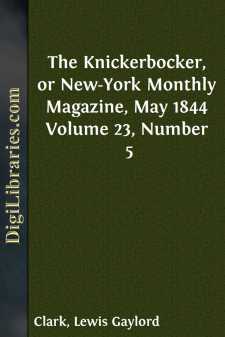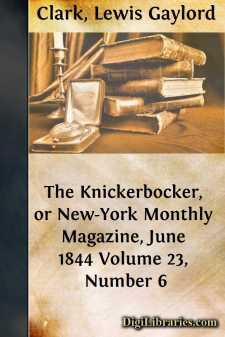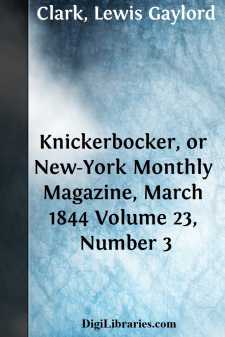Categories
- Antiques & Collectibles 13
- Architecture 36
- Art 48
- Bibles 22
- Biography & Autobiography 813
- Body, Mind & Spirit 142
- Business & Economics 28
- Children's Books 15
- Children's Fiction 12
- Computers 4
- Cooking 94
- Crafts & Hobbies 4
- Drama 346
- Education 46
- Family & Relationships 57
- Fiction 11828
- Games 19
- Gardening 17
- Health & Fitness 34
- History 1377
- House & Home 1
- Humor 147
- Juvenile Fiction 1873
- Juvenile Nonfiction 202
- Language Arts & Disciplines 88
- Law 16
- Literary Collections 686
- Literary Criticism 179
- Mathematics 13
- Medical 41
- Music 40
- Nature 179
- Non-Classifiable 1768
- Performing Arts 7
- Periodicals 1453
- Philosophy 64
- Photography 2
- Poetry 896
- Political Science 203
- Psychology 42
- Reference 154
- Religion 513
- Science 126
- Self-Help 84
- Social Science 81
- Sports & Recreation 34
- Study Aids 3
- Technology & Engineering 59
- Transportation 23
- Travel 463
- True Crime 29
The Knickerbocker, or New-York Monthly Magazine, May 1844 Volume 23, Number 5
Description:
Excerpt
The following article has been compiled from the different works of Thomas Carlyle, and embodies all he has written, or at least published, about Napoleon Bonaparte. We offer it in the absence of a more elaborate work on this subject, which we hope one day to see from the pen of this gifted and earnest writer. It is a glimpse of the insight of the clearest-headed Seer of our age, into the noisiest great man of the last, about whom we listen with pleasure to each new voice, perhaps critically and doubtingly, yet for our own part colored by that absorbing, painful interest, which induced us when a boy to close the book which first told us of his doings, after having traced his meteoric flight to the ‘monster meeting’ at Moscow, unable to proceed to the catastrophe; and it was months before we could bring ourselves to read on, of the heroism which charmed, or the glitter which dazzled us, to its final chaos and night. On Napoleon’s right to the title great, the character of his greatness, and what would be left if the smoke-clouds, battle-glory and so on were torn away, we will offer but a few words. Of the title in its best sense but few now believe him worthy, perhaps no thinker or reflecting man. He is a volcano rather than a sun, a destroyer more than a creator; and our sympathy is mingled with little of that which we feel for the martyr; who dies rather than sell his birthright, heaven, for any mess of earth’s pottage, or for him who spends his life in the search for truth, and in speaking it to mankind, taking no heed for himself what he shall eat and wherewithal he shall be clad. No! the feeling is far more akin to that which we have for a deep-playing gambler, whom we know to have some noble impulses. How eagerly, yet sorrowingly we watch his movements! The dice rattle, they are thrown, and again thrown; thousands after thousands he wins and lays aside; and at last, in the madness of the game, stakes the whole sum, with his house, estate, all on the hazard of one cast. With beating heart we listen to the rattling of the dice, and with strained gaze watch the blow. The box is lifted—all is lost. Now we are excited by the daring of this being, and feel deeply, more so if we know him to have something of a better nature, some nobler impulses, but the interest is still in the great gambler, not in the great man; and though his boldness startles, and for the moment carries us away, yet ever with our admiration comes a still small voice from the ‘inner sanctuary,’ which whispers of those whom his winnings ruined, or the dependents who were reduced to beggary by his loss. Would the great man have played the game at all?
We have always felt that Napoleon stepped down from his greatness when he let them hurry him away alive to that island-prison; and there is reasoning in this feeling itself, which most persons feel on reading of his career, which his worshippers would do well to consider in its various bearings; for if Napoleon, (when the royal guard, his last hope, was cut to pieces at Waterloo, and crying to Bertrand, ‘It is finished,’ he turned and fled,) had placed himself before the last cannon which sent destruction to his foes, and let its ball end his career and life together, who is there but would feel that he was acting truer to his greatness, than to ‘eat his heart away’ a captive? If throughout his career we had seen the brave fighter for country, for principle, for right, instead of for self, this feeling would never arise. Place Washington in a similar situation; imagine him to have believed it best to gather all his country could give him of hardy defenders, and on the result of one battle let his country’s fate be decided. The battle is fought and lost; his army is routed and cut to pieces; he has asked for liberty with his whole strength, with his whole soul, and the answer is ‘No!’ written with bayonets in blood, and voiced by the enemy’s cannon. Would Washington have been true to his greatness in placing himself before the last cannon? No! emphatically, no! With Napoleon he might have cried, ‘It is finished,’ but then with the same calm brow yet bursting heart, he would have resigned his sword to his conquerors; and if the scaffold were his fate, met it with quiet dignity; or if the dungeon, there calmly await the Almighty’s time when he might again raise his right arm for his country; still as great in the prison or on the scaffold, as when he was at the head of conquering armies. Napoleon’s intellectual character was perceptive rather than deep; and there is an intense concentrativeness about him, a power of throwing the whole effort of his soul into the environment of the moment, which is remarkable; and not less so the facility with which he changes that concentration from place to place, from subject to subject. Probably no man ever had his whole mind so much under the control of his will, at his fingers’ ends, as it were; ‘the eye to see and the will to do.’ But revert we to Carlyle.
Some call for Barras to be made commandant; he conquered in Thermidor. Some, what is more to the purpose, bethink them of the Citizen Bonaparte, unemployed artillery officer who took Toulon. A man of head, a man of action: Barras is named Commandant’s Cloak; this young artillery officer is named Commandant. He was in the gallery at the moment, and heard it; he withdrew some half hour to consider with himself: after a half-hour of grim compressed considering, to be or not to be, he answers yea. And now, a man of head being at the head of it, the whole matter gets vital. Swift to camp of Sablon, to secure the artillery; there are not twenty men guarding it!...




